A new plan - in 60 days
Are safe, free buses possible? … Tough guys spar in Congress … And you’d never visit a restaurant with 1.7 stars.
The Tucson City Council ended this week’s meeting divided on how to use strained city resources to combat an estimated 40 violent instances per day reported on city-run buses and bus stops.
The seven Democrats on the Council largely agreed on the underlying issues — a public health crisis tied to fentanyl use, a homeless population that has mental health issues, and not enough police officers to respond.
But a real solution from the city is still months or even a year away, depending on what the Council eventually decides.
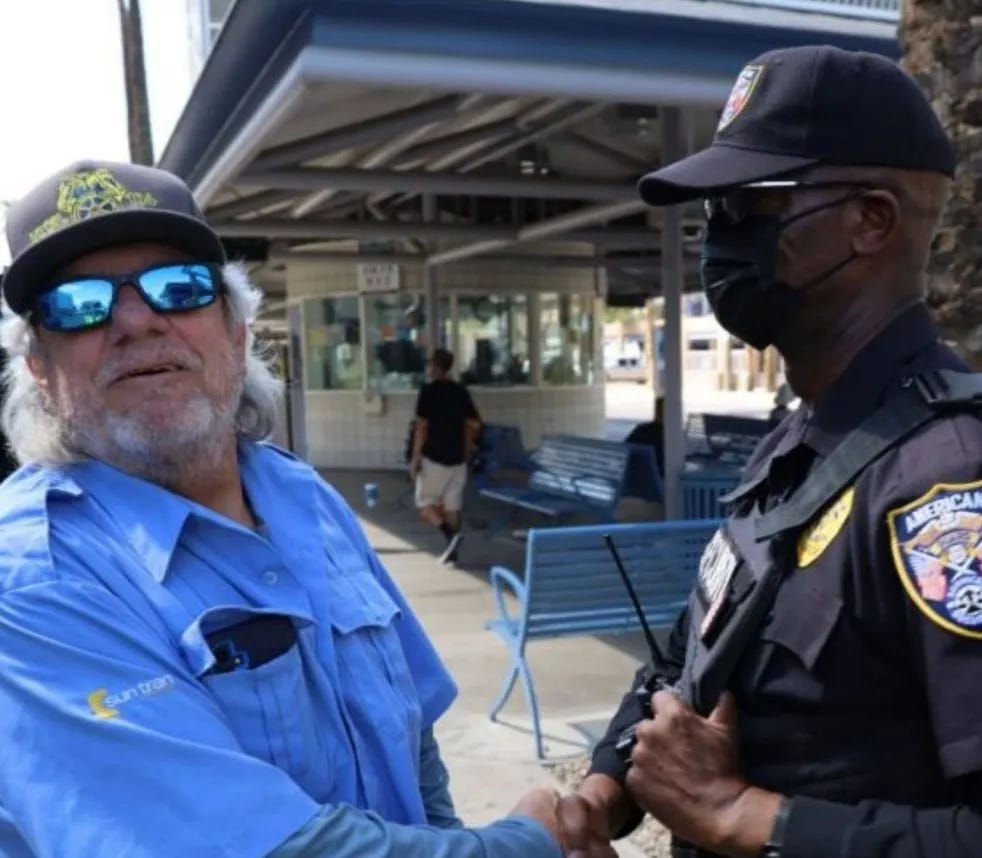
For the moment, a proposal from Vice Mayor Lane Santa Cruz that modifies the transit safety action plan offered by city staff on Wednesday is moving forward.
The plan, which will take two months to implement, would:
Coordinate the presence of TPD and contracted security
Prioritize hot-spot stops and corridors
Deploy Transit Ambassador/Outreach teams
Consult with SunTran operators to identify safety infrastructure and operator protections (lighting, CCTV, operator enclosures, panic/duress systems)
Require written operator safety protocols and training for Sun Tran operators
Adopt and actively promote the use of the free Transit app, widely used by transit systems nationwide, to enable real-time rider feedback.
And require the city manager to work with the state and local jurisdictions to provide substance abuse and mental and behavioral health resources.
Councilman Paul Cunningham said his colleagues aren’t being realistic and are instead pushing forward with a wish list of changes that don’t have any identified additional funding.
“I don’t think anything in this motion can be funded,” Cunningham said.
Cunningham argued that the Council should let voters decide whether to again start charging fares to ride the bus, noting that reinstating fees would bring in $8 million in additional revenue, which could be used to better protect unionized bus drivers and passengers.
Councilwoman Nikki Lee supported Cunningham in spirit, pushing to reinstate fees for “those who can afford it.”
But Santa Cruz shot back that Cunningham is trying to resurrect and reconsider a decision made by the Council to continue with free fares for rides for at least another year, and his motion ultimately failed.
Practically speaking, Cunningham’s failed proposal would not go before voters until at least next spring anyway. And if voters backed the measure, it would take several additional months before the city would see revenues.
Meanwhile, there may be another option besides reinstating fares.
If voters agree to extend the taxing authority for the Regional Transportation Plan next spring for another 20 years — often referred to as RTA Next — the city believes it could get another $2.15 million per year for additional security.
The funding, as recommended, would pay for 15 new guards, increased maintenance, and “special” Tucson Police Department deployments to improve transit security.
Tucson Mayor Regina Romero said violence and drugs on buses isn’t just a Tucson problem — it’s happening in other cities and towns as well.
The two-term Democrat said while she wants to make sure that the city offers resources to the most vulnerable for those living on the street, her colleagues must recognize that some people are refusing city resources, and the city must take more aggressive action against criminals using fentanyl and other substances.
“There has to be consequences for unlawful behavior,” Romero said.
Two weeks ago, the Council discussed creating a misdemeanor for open drug use, potentially allowing the city, rather than the Pima County Attorney’s Office, to charge people for using fentanyl and other drugs.
That’s on the table because councilmembers are frustrated with the county attorney’s office, saying it is not prosecuting drug-related misdemeanors frequently enough. That has created a revolving door with criminals addicted to drugs getting arrested, released from jail, and then re-offending.
Tucson Police Chief Chad Kasmar told the Council that arresting people on the bus is only half of the issue. An arrest gives people time to reassess their personal situation while in jail. But the city doesn’t currently have the ability to prosecute individuals for drug use, so they quickly end up back on the streets.
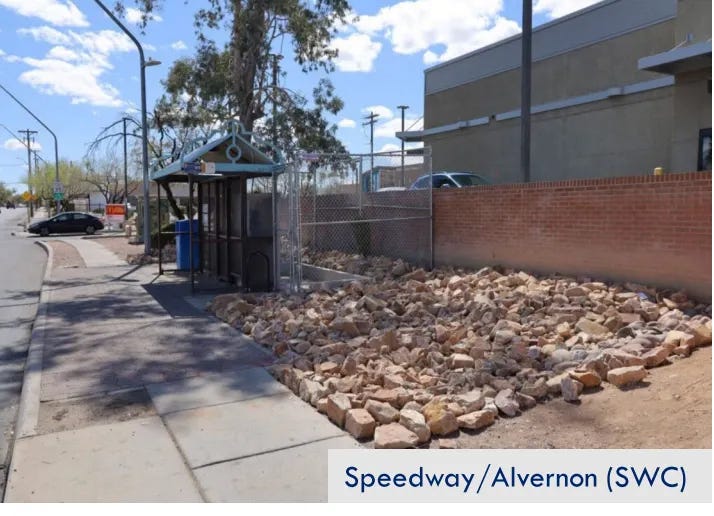
The director of the city’s Transportation and Mobility, Sam Credio, said the city has been placing rocks and moving equipment
Credio also recommended that the city close restrooms at the city’s transit centers at night, noting that, in addition to constant vandalism, people have been locking themselves inside overnight.
At any given time, the city has four roving security guards tied to transit safety, Credio told the Council.
A new security plan is expected to come back before the Council in 60 days.
They’re already on it: Democratic Sen. Mark Kelly and Republican U.S. Rep. Juan Ciscomani each held a press conference on Tuesday to discuss the budget battle that led to the federal government shutdown, Paul Ingram writes for the Tucson Sentinel. Meanwhile, Kelly and fellow Democratic U.S. Sen. Ruben Gallego got into it with Speaker Mike Johnson in the hallways of Congress, demanding answers about why Adelita Grijalva hasn’t been sworn in yet. The exchange is worth a watch.
“I am anxious to administer the oath to her as soon as you guys vote to open the government,” Johnson said, adding the idea that the delay has anything to do with the Epstein files is “totally absurd.”
Democrats ride with the Wildcats: Southern Arizona Democratic lawmakers wrote a letter to University of Arizona President Suresh Garimella, urging him to reject the Trump administration’s proposed higher education “compact” for universities. The seven Tucson-area Democrats said signing it would turn university officials into “enforcers of federal ideology rather than defenders of scholarly inquiry.” Last night, the Tucson City Council also unanimously backed a resolution calling on UA to reject the compact.
“The City of Tucson opposes President Trump and Administration’s ‘Compact for Academic Excellence in Higher Education’ as an unacceptable act of federal interference that undermines local control, academic freedom, and opportunity for our residents,” the City Council resolution reads.
Sign of the times: The Arizona Daily Star is now being printed in Las Vegas, at the same place the Arizona Republic is printed, the Star’s executive editor David McCumber told readers. Now that the Star is rolling off the presses owned by the Las Vegas Review-Journal, print deadlines will be moved up even further in the day than they were six years ago when the Star moved its printing operation to Phoenix.
We’re old enough to remember the feeling of a printing press rattling the bones of newspaper offices. And we’re crazy enough to believe that people will still pay for real local news.
Set free: Tucsonan Logan Hollarsmith was released by the Israeli government, KJZZ’s Alisa Reznick reports. Hollarsmith, who advocates for migrants in Southern Arizona and works as a carpenter, was detained while captaining a boat in a flotilla that was meant to deliver supplies to Gaza.
The problem is down here: NASA’s Mars Reconnaissance Orbiter is well-positioned to take photos of Comet 3I/Atlas, which is just the third interstellar object ever recorded entering our solar system. The orbiter’s cameras took photos last week, but so far, only amateurs are able to analyze them. The government shutdown means NASA and scientists at the University of Arizona can’t release any information, the New York Times reports.
“We are supposed to communicate through NASA, currently not possible due to the shutdown,” Alfred McEwen, a planetary geologist at the UA who is the principal investigator for the camera aboard the American orbiter, said in an email.
It is never good when the internet suggests using Apple Maps as an alternative to your app.
The Sun Tran app — developed for the city by a third-party contractor — might need a refresh.
Right now, the app has 1.7 stars out of 5.


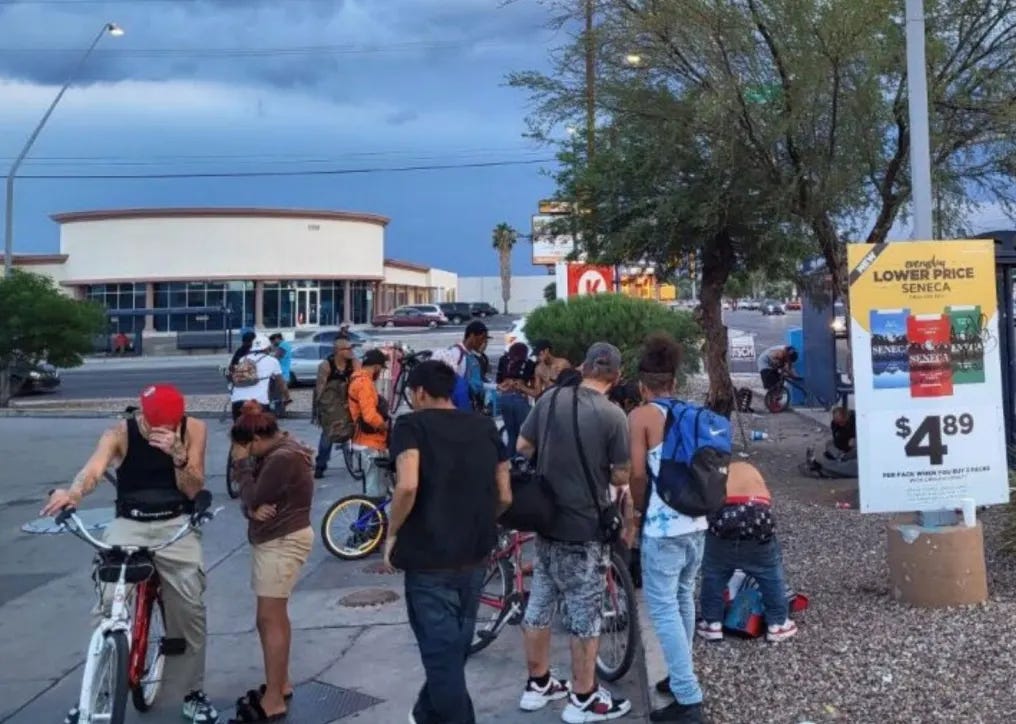

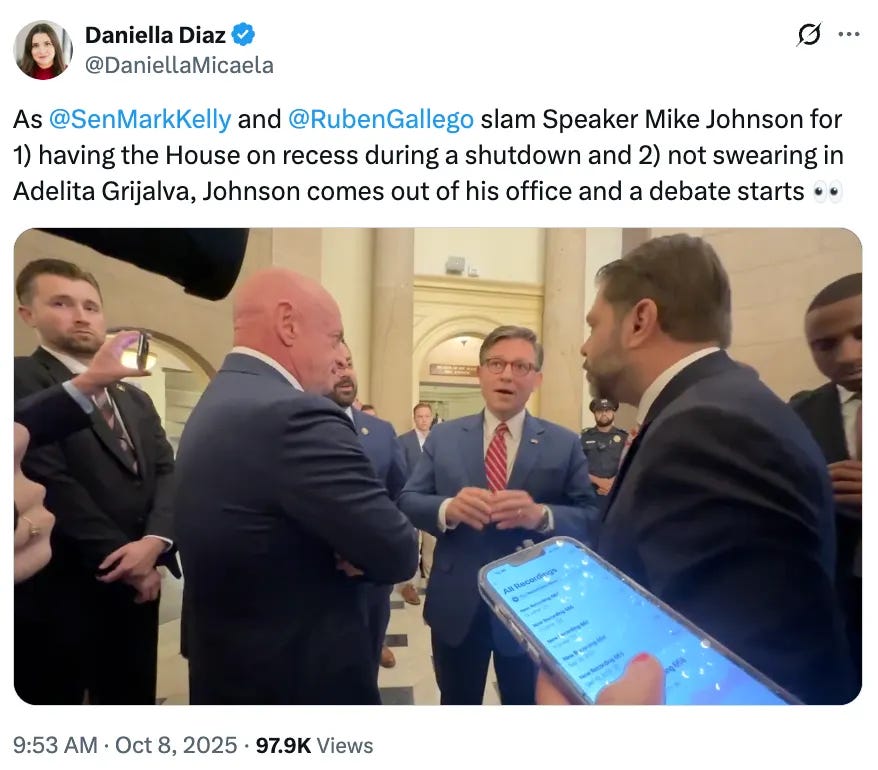

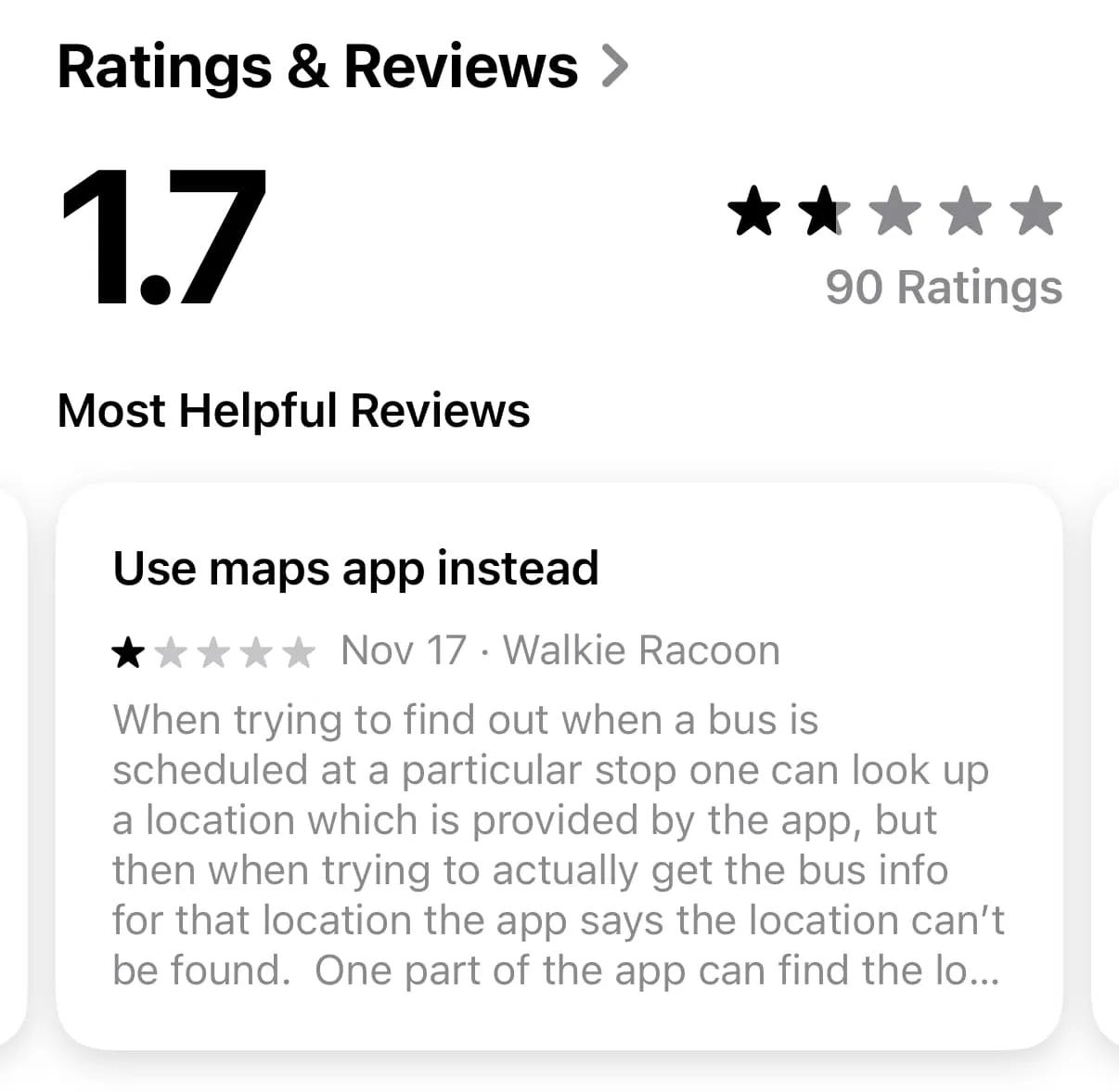
It’s tough for me to see elected officials from my own party continue to apply an equity-only lens to something that would benefit from an equality lens. By continuing to punt on transit safety, our council runs the risk of alienating union workers (who have likely voted for these elected officials in the past) and people living in poverty (i.e, the majority of riders who rely on Sun Tran but are housed), which is a larger portion of their voting base and constituency than unhoused folks (who they’ve deemed “the most vulnerable”). Our party has for some reason abandoned the every day person in the interest of (mostly) white, (mostly) middle-upper class, bleeding heart liberals whose goal with homelessness is simply to take it easy on folks who simply don’t want resources. At the August meeting when council decided to extend free transit, Councilmember Uhlich said that we shouldn’t reinstate transit fare due solely to the bad behavior of “a couple hundred people” at transit stops. Does that mean, then, that we disregard the majority voice when those couple hundred folks make this (very expensive) resource intolerable? I hope that council at least lets TPD take the lead on enforcement here, because they seem so lost and misguided at this point.
I could be completely out of touch, or wrong, but is fare free bus usage the real reason for all these problems? I hear, drug usage, homelessness, mental health and violence which are problems with or without a free bus fare. Can’t really blame all societal problems on free fares, can we? Yes, money is the crux of it all. Let’s talk about who we elect as our state and federal officials. Since the age of lower tax we’ve seen societal problems rise. Don’t forget, conservatives want to go back to the age of the 1950’s, like Father Know Best, but those were the days of the highest taxes. They like to leave that part out.